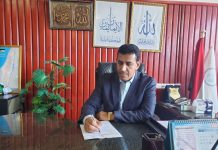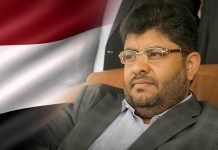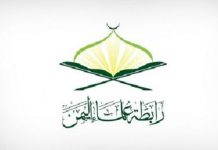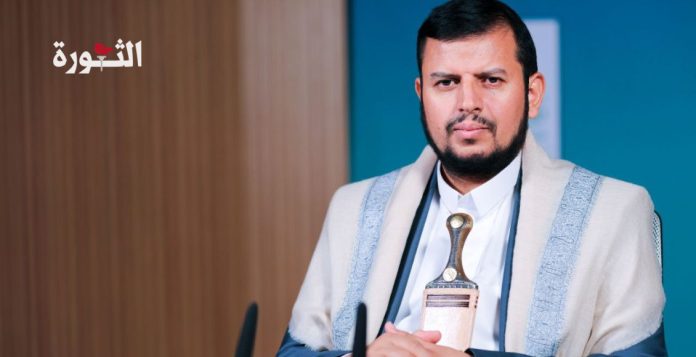Revolution Leader Sayyed Abdulmalik Badr al-Din al-Houthi emphasized on Thursday that responding to the Occupation’s aggression targeting fuel tanks in Hodeida port is inevitable.
In a speech addressing recent developments in the enemy’s aggression on Gaza and regional issues, the Leader explained that the delay in response by the broader axis to the Israeli escalation—including the targeting of Commander Ismail Haniyeh, the aggression on the southern suburb, and the targeting of Commander Fouad Shukr—is a tactical measure aimed at ensuring a more effective response against the enemy.
He noted that the enemy is aware of the inevitability of the response, which is being prepared with the supervision of the Americans, and involves cooperation from Western and some Arab regimes.
The Leader asserted that no amount of intimidation or pressure would deter the decision to respond. He highlighted ongoing efforts by American, European countries, and some Arab regimes to mitigate the response, particularly concerning the Islamic Republic of Iran.
Despite these attempts to convince the Islamic Republic to limit its response, the Islamic Republic remains resolute, viewing the situation as a matter of honor due to the killing of its guest in its capital.
Al-Houthi reiterated that the decision to respond is a unified stance across the entire axis and each front. He remarked that the recent crimes targeting leaders of the nation and key figures in jihadist efforts have significantly impacted the overall situation.
The Leader praised Hamas’s continued cohesion and effectiveness, despite the enemy’s attempts to undermine its steadfastness and stability.
He announced that Hamas has appointed the distinguished Mujahid/fighter Yahya al-Sinwar as the successor to the martyr Ismail Haniyeh. Sinwar is, God willing, the most fitting successor to such a revered predecessor. The unanimous choice of the esteemed leader al-Sinwar, recognized by both allies and adversaries for his steadfastness, wisdom, and leadership, sends a significant message to the Occupation enemy.
Al-Houthi clarified that al-Sinwar’s appointment is a clear sign of ongoing steadfastness in jihad, reaffirming commitment to core principles and positions.
The Leader emphasized that the Hezbollah front has maintained its support with highly effective and impactful strikes, underscoring the inevitability of a response to the targeting of Leader Shukr and the aggression on the suburb.
He noted that the Occupation enemy, following its severe escalation, is experiencing profound fear on all fronts.
He affirmed that the Islamic Republic of Iran has confirmed its response at the highest levels of leadership, and this matter cannot be overlooked.
He added that support continues to flow from southern Lebanon, Yemen, and Iraq, and the response remains inevitable and unquestionable.
Arab and Islamic Failure:
Sayyed Abdulmalik Badr al-Din al-Houthi criticized the general Islamic response as inadequate, noting that the statement from the Organization of Islamic Cooperation should not represent the full extent of Islamic countries’ positions.
Al-Houthi remarked that a charitable organization or a smaller institution could have issued a more effective statement regarding the assassination crimes.
He emphasized that some Arab regimes could at least halt cooperation with the Israeli enemy, pointing out that four Arab regimes, along with certain Islamic regimes, are significantly cooperating with the enemy.
He said, “Those who sympathize with scratching Trump’s ear did not even issue statements of condemnation expressing their position on the crime of targeting a major Islamic leader,” noting that some Arab regimes still classify the Palestinian factions, most notably al-Qassam Brigades, Hamas, Al-Quds Brigades, Islamic Jihad, and the rest of Mujahideen, as terrorists.
The Leader of the Revolution highlighted that despite the severe nature of the Israeli enemy’s crimes, some Arab regimes do not regard these acts as criminal or terrorist in nature.
He explained that some Arab regimes, with their cold and rigid stances, are using their media outlets to overtly support the enemy, serving as a clear and blatant ally to it.
Al-Houthi emphasized that it is a great honor and a duty for the axis of al-Quds, Jihad, and Resistance to support the Palestinian people, and this obligation falls on the entire nation.
He highlighted that some Arab regimes align with those loyal to the enemy, acting as a media, political, and popular support front for Israel.
The leader stressed the importance of continually reminding and mobilizing the nation to address the grave injustice faced by the Palestinian people and their ongoing tragedy.
He asserted that the responsibility towards the Palestinian people’s plight cannot be dismissed or ignored, and neglecting their suffering has serious consequences.
Al-Houthi urged that awareness, reminders, and mobilization campaigns must persist as long as the Palestinian tragedy continues and worsens.
He praised the steadfastness, perseverance, and patience of the Mujahideen/ fighters in Gaza, describing it as a model for the entire nation and the world.
Al-Houthi condemned those who have betrayed or conspired against the Mujahideen/fighters in Gaza and those who, through their media, finances, and positions, serve the enemy.
The Leader of the Revolution noted that despite ten months of aggression and siege, al-Qassam Brigades, al-Quds Brigades, and their allies in Gaza continue their resistance.
Al-Houthi commended their heroism and patience, which he believes will lead to victory as promised by God.
He affirmed that the Mujahideen in Gaza are engaged in continuous and varied operations to challenge the Israeli enemy, with the support of the local population, despite severe conditions of hunger and suffering.
Al-Houthi lauded the Palestinian people’s resilience, stating that their steadfastness is crucial for the nation, and warned that Arab regimes that serve America and Israel will always be seen as replaceable.
Expansion of Regional Conflict:
The Leader of the Revolution emphasized that expanding the conflict to a regional scale, or even less, would benefit the Palestinian people rather than the Israeli enemy.
He noted that the Israeli strategy has been to isolate and exterminate the Palestinians in Gaza while achieving its own declared and undeclared objectives. Despite its efforts, the Israeli enemy has not yet succeeded and will likely face more losses and failures.
As the situation worsens on a larger scale, the Israeli enemy will become increasingly preoccupied and fearful, seeking assistance from America and its allies.
The Leader pointed out that some Arab regimes are supporting the Israeli enemy through their media and political channels, and this support undermines the agreements between Arab countries and their obligations.
He criticized the American and some Arab regimes for protecting the Israeli enemy while dismissing the value of Arab and Islamic commitments.
Al-Houthi highlighted that the Israelis view some Arab regimes as partners in their protection and that the Israeli enemy is experiencing significant fear and anxiety. The recent escalation by Israel reflects its deep concern.
He praised Hezbollah’s operations, noting their significant impact on the Israeli enemy, and described these strikes as an unprecedented strategic challenge for Israel. He assured that the Iraqi support front will continue its operations.
Yemeni Support Front:
The Leader of the Revolution reported that this week, the Yemeni support front launched operations involving 16 ballistic missiles and a drone, targeting two American destroyers and shooting down an MQ-9 drone.
The Yemeni forces have targeted 177 ships, and the decrease in navigational activity linked to American, British, or Israeli interests is considered a victory for Yemeni forces.
He stated that the disruption of maritime movement associated with the Israeli enemy has caused significant distress, including the paralysis of the Umm al-Rashrash port.
The scope of Yemeni operations has expanded to the Indian Ocean, Mediterranean Sea, and beyond, he added.
The Leader emphasized the vast and challenging nature of the battle, requiring advanced technologies and capabilities to strike moving targets.
He noted the significant role played by various Arab countries in protecting the Israeli enemy, highlighting the need for Yemen to enhance its capabilities to overcome these challenges.
Popular Activities and Demonstrations:
The Leader of the Revolution praised the ongoing popular activities, demonstrations, and weekly marches, which he described as unprecedented and a source of pride for the Yemeni people.
Al-Houthi noted that these activities provide real support to the Palestinian people and that demonstrations continue even in non-Muslim European countries.
He commended the Moroccan people for their ongoing demonstrations despite their regime’s collaboration with Israel.
The Leader extended condolences to those affected by floods in Al-Hodeidah Governorate and other areas, urging both official and popular efforts to support affected communities.
Al-Houthi also stressed the importance of urban planning and caution against random construction in flood-prone areas, hoping that the rainy season will positively impact agriculture.
Sayyed Abdulmalik Badr al-Din al-Houthi urged official authorities to dedicate maximum efforts to assist those affected by the floods and to prevent further damage in other areas.
He declared, “Tomorrow is the day to reaffirm our loyalty and steadfastness by delivering a message of support and backing to our esteemed Mujahid/fighter brother Yahya al-Sinwar, the Mujahideen of al-Qassam Brigades, and the entire Hamas movement, as well as to all Palestinian factions.”
The Leader called on the Yemeni people to participate in millions march tomorrow to demonstrate continued support and to show that a response is forthcoming.
He emphasized the importance of attendance at this crucial time to convey messages of support and commitment, underscoring that the resistance is at a critical juncture in the battle.




















